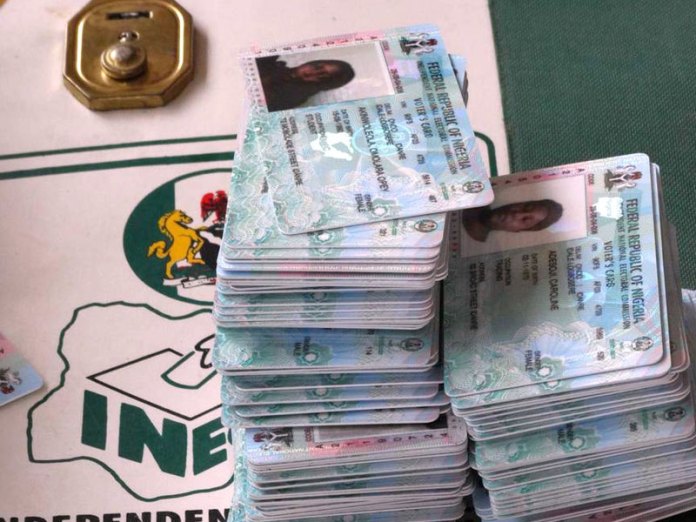- Voter Registration, PVC Distribution Begins in April for 2019 Polls
The Independent National Electoral Commission (INEC) has said it would kick-start preparations for the 2019 general election with the continuous voters’ registration and distribution of Permanent Voters’ Cards (PVCs) in April.
Also the commission gave an update on the growing number of political associations seeking registration as political parties ahead of the 2019 general election, saying it has now reached 85.
In a communique issued after the quarterly meeting with leaders of political parties held at INEC headquarters in Abuja, yesterday the parties endorsed the 2019 general election timetable and agreed to cooperate with the commission in all the processes leading to the smooth conduct of the election.
The communique was jointly signed by the Deputy Chairman of the Inter Party Advisory Council (IPAC), Dr. Bredforth Onwubuya, for other political parties and a National Commissioner, May Agbamuche-Mbu, on behalf of INEC.
Earlier, while speaking during the opening ceremony of the quarterly meeting, the Chairman of INEC, Prof. Mahmood Yakubu, said as at last Monday, the number of applications from new associations for registration as political parties had reached 86.
INEC had last Thursday put the figure of the associations seeking registration at 84.
Yakubu also said the 10 political parties which were previously de-registered by the commission after the 2015 general election, had regained their registration.
The political parties, according to him, are Better Nigeria Peoples Parties (BNPP), Peoples Redemption Party (PRP), Peoples Progressives Party (PPP), Democratic Alternative (DA), National Action Council (NAC) And National Democratic Liberty Party (NDLP).
Others are Masses Movement of Nigeria (MMN), National Conscience Party (NCP), Nigeria Element Progressives Party (NEPP) and the National Unity Party (NUP).
The INEC boss who described political parties as an important vehicle for the sustenance of the country’s democracy, urged the party leaders to always have confidence the electoral system as a way of promoting stability in the polity.
“The names of these political parties have already been uploaded on our website. But I will like to appeal to those of them, out of the 10 that are yet to open their offices to do so and immediately notify the commission,’’ Yakubu said.
In his remark the IPAC Chairman, Mohammed Nalado, expressed displeasure over the inability of INEC to consult properly with political parties before fixing dates for the 2019 general election .
Nalado said though INEC chairman informed them of the decision but they did not know weather the information he gave them was official or not until they read the report on the pages of newspapers.
“We had meeting with INEC chairman, unfortunately, we did not understand him weather he was telling us officially or he was just giving us information on how our elections should be done.I hope this issue will be discussed thoroughly here,” Nalado said.
He affirmed IPAC’s commitment to work with INEC in deepening the country’s democracy.
Nalado, however, advised INEC to seek alternative to deregistration of political parties.
He also urged the commission newly appointed National Commissioners to make their relevant inputs to the development of the electoral system.
The National Chairman of the United Democratic Party (UDP), Mr. Godson Okoye, in an interview with journalism said it was a disrespect for INEC to fixed date for elections without consulting political parties.
The crisis-ridden main opposition party, the People Democratic Party (PDP), was represented at the meeting by Senator Ali Modu Sheriff who sent his Deputy National Chairman, Dr. Cairo Ojougboh, and PDP National Secretary, Prof. Wale Oladipo, to stand-in for the party.
Among the issues discussed at the meeting were the proposed INEC’s strategic plan for 2017-2021, impact of court judgments on the roles of political parties, violence in the conduct of party primaries and elections in general.
Others are internal party democracy, political parties and campaign finance nationwide continuous voters registration, outstanding Anambra Central senatorial rerun election. There was also a brief presentation on INEC new innovations .
On the outstanding Anambra Central senatorial rerun election, IPAC according to Breakforth, has urged INEC to liaise with concerned political parties to resolve ongoing litigation for the conduct of the election.
“In view of the recent Supreme Court judgment on the election, it was agreed that INEC shall work with the political parties that have cases in the lower court to find amicable ways to resolve all going litigations out of court. This is to enable the commission conduct the outstanding election in the senatorial district.
INEC shall engage with the parties involved based on this principle,’’ he said.
The Director of Voter Education and Publicity in INEC, Mr Oluwole Osase-Uzzi, who also spoke at the end of the meeting, said the commission had accepted to exploit an out-of-court settlement in disputed the Anambra Central senatorial election.
“INEC is prepare to conduct the election as soon as all legal impediments are removed,’’ Osase-Uzzi added.
On what would happen to the announced dates for the 2019 general election if the ongoing Electoral Act amendments was concluded before the election, Osase-Uzzi said the commission was working with the current law.
“We are working with an extant law and the time for election is fixed by the constitution. So, if the constitution is amended before 2019 or that day and it necessitates the change, then we comply with whatever extant law that is available before the election. But if it is not amended before then, we go with the date as it stands now. INEC is bound to go with whatever the law states,” he said.


 Naira3 weeks ago
Naira3 weeks ago
 News4 weeks ago
News4 weeks ago
 Naira4 weeks ago
Naira4 weeks ago
 Naira3 weeks ago
Naira3 weeks ago
 Jobs3 weeks ago
Jobs3 weeks ago
 Travel3 weeks ago
Travel3 weeks ago
 Naira3 weeks ago
Naira3 weeks ago
 Investment4 weeks ago
Investment4 weeks ago





























